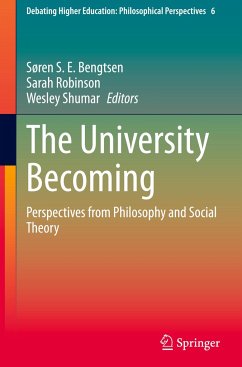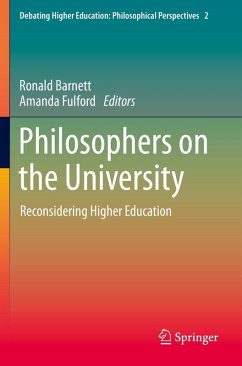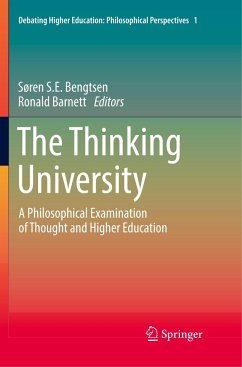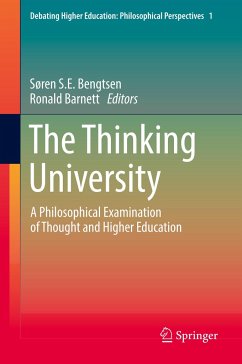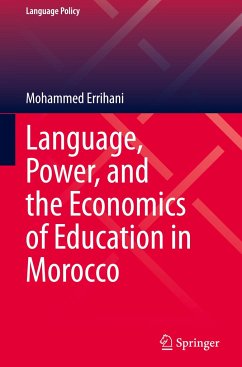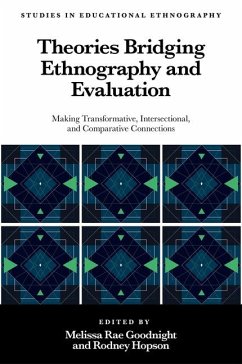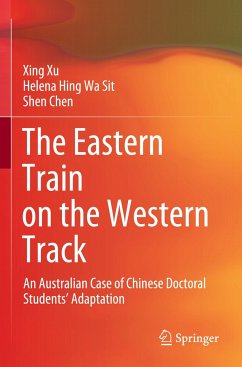
The University Becoming
Perspectives from Philosophy and Social Theory
Herausgegeben: Bengtsen, Søren S. E.; Robinson, Sarah; Shumar, Wesley
Versandkostenfrei!
Versandfertig in 6-10 Tagen
121,99 €
inkl. MwSt.

PAYBACK Punkte
61 °P sammeln!
This volume wholeheartedly engages with the current climate in higher education and provides not only a thorough analysis of the foundational elements constituting higher education but also a critical discussion of possible connections to societal and cultural domains and policy debates.Today, higher education institutions and programs are beset with multiple, and often conflicting, pressures and demands. Higher education is regarded by societies in general, and at the political level in particular, as a pathway to securing continued economic growth and ensuring cultural growth in surrounding ...
This volume wholeheartedly engages with the current climate in higher education and provides not only a thorough analysis of the foundational elements constituting higher education but also a critical discussion of possible connections to societal and cultural domains and policy debates.
Today, higher education institutions and programs are beset with multiple, and often conflicting, pressures and demands. Higher education is regarded by societies in general, and at the political level in particular, as a pathway to securing continued economic growth and ensuring cultural growth in surrounding societal contexts. Future academics are expected to become experts within their disciplines and at the same time to acquire and develop generic competences and transferable skills directly translatable into job market and professional contexts. These conflicting and fragmented policy approaches to higher education leaves academic leaders, teacher, researchers, and students with an incoherent curriculum and a confused and eroded academic identity and societal outlook.
Much literature within higher education research that engages with similar topics are dominated by a backwards-looking and heavy critique of current political and educational conditions for the university and higher education. This volume suggests a new tack that is defined by openness and optimism towards possibilities for a transformative higher education curriculum - that at the same time stays firmly rooted within the foundational academic soil. By drawing on, and contributing to, the emerging research field the philosophy and theory of higher education, the book combines critique with a constructive and future-oriented approach and outlook on higher education. Further, it combines and links philosophical discussions on the idea of the future university with societal responsibility and a curricular and formational awareness.
Today, higher education institutions and programs are beset with multiple, and often conflicting, pressures and demands. Higher education is regarded by societies in general, and at the political level in particular, as a pathway to securing continued economic growth and ensuring cultural growth in surrounding societal contexts. Future academics are expected to become experts within their disciplines and at the same time to acquire and develop generic competences and transferable skills directly translatable into job market and professional contexts. These conflicting and fragmented policy approaches to higher education leaves academic leaders, teacher, researchers, and students with an incoherent curriculum and a confused and eroded academic identity and societal outlook.
Much literature within higher education research that engages with similar topics are dominated by a backwards-looking and heavy critique of current political and educational conditions for the university and higher education. This volume suggests a new tack that is defined by openness and optimism towards possibilities for a transformative higher education curriculum - that at the same time stays firmly rooted within the foundational academic soil. By drawing on, and contributing to, the emerging research field the philosophy and theory of higher education, the book combines critique with a constructive and future-oriented approach and outlook on higher education. Further, it combines and links philosophical discussions on the idea of the future university with societal responsibility and a curricular and formational awareness.





